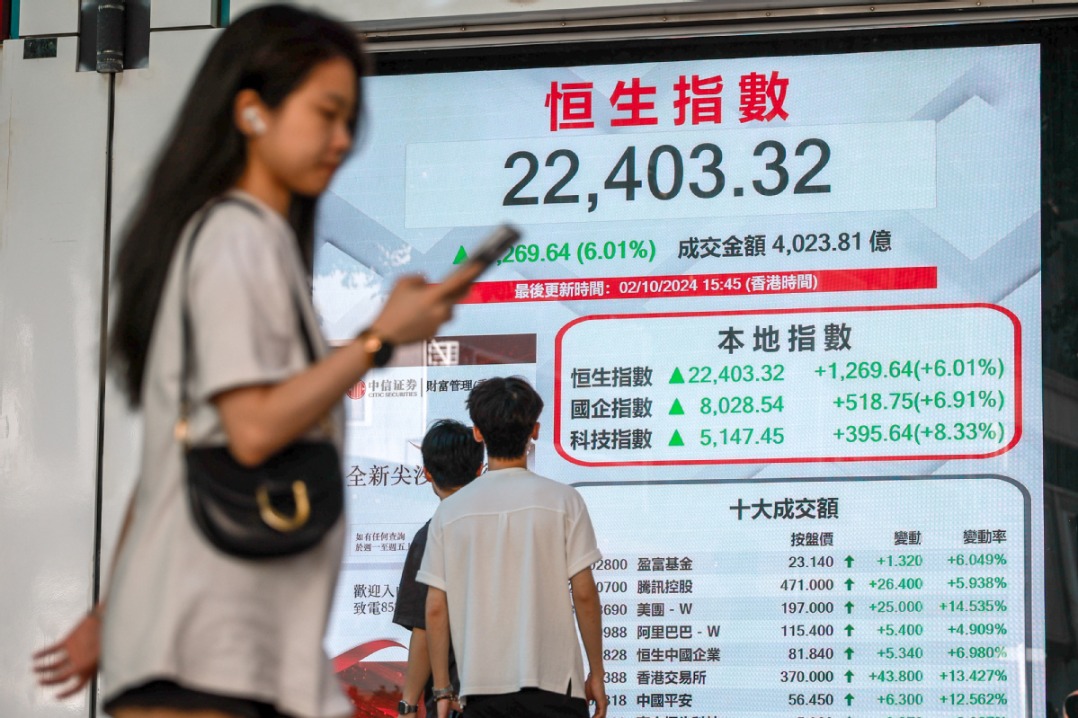All-weather friends
China-Pakistan cooperation has withstood changes and will be a solid anchor for peace, while bringing more benefits to their peoples through win-win cooperation

China-Pakistan cooperation has withstood changes and will be a solid anchor for peace, while bringing more benefits to their peoples through win-win cooperation

The world is undergoing significant changes that are driven by internal and external factors. The political landscape in South Asia and the northern Indian Ocean region, too, is undergoing a major shift. In this backdrop, increased cooperation between China and Pakistan, which share similar strategic and national interests, will help preserve regional and international stability and create a geopolitical landscape that serves the common interests of the two countries.
After taking office in 2021, US President Joe Biden largely inherited the national security strategy of the Donald Trump era, which is to tackle challenges to the US' global hegemony. To this end, the Biden administration withdrew US troops from Afghanistan in 2021, putting an end to its 20-year global war on terrorism. As a result, Pakistan, which served as a "front-line nation" in the United States' war against terror, has become less important to the US, while its neighbor India has become a close partner of the US thanks to its high geopolitical value.
In February 2022, the US released its "Indo-Pacific strategy", which recognized India as "a like-minded partner", "a leader in South Asia and the Indian Ocean", "a driving force of the QUAD and other regional fora" and "an engine for regional growth and development" and supported "India's continued rise and regional leadership".Likewise, the US National Security Strategy gave priority to "promoting a free and open 'Indo-Pacific'" in its strategy by region. It identified India as "a major defense partner" and "a partner with shared values" with whom the US will jointly advance the "shared vision of a free and open Indo-Pacific".
By contrast, US-Pakistan ties have reached a relative low point. After taking office, Biden did not call former Pakistani prime minister Imran Khan, making him a rare Pakistani prime minister who did not engage with a US president during his tenure. The bilateral ties improved after Khan was ousted. The US approved the sale of F-16 aircraft sustainment and upgrading services to Pakistan, and resumed cooperation mechanisms including the mid-level defense dialogue and the Trade & Investment Framework Agreement Council.
Nevertheless, US-Pakistan ties face severe problems in areas such as political mutual trust, economic coordination, as well as cooperation in security and diplomacy compared with the Cold War era and the anti-terrorism war period. In spite of the positive remarks by the Pakistani government about the US, the memory of "US cold shoulder" is still fresh in the minds of Pakistanis, who are well aware of the US utilitarianism — "wooing Pakistan when it is needed, and discarding it when not".
In comparison, the all-weather strategic cooperative partnership between China and Pakistan has withstood changes in the international situation. Since the 1960s, the two neighbors have developed an ironclad friendship that is "higher than mountains, deeper than oceans, and sweeter than honey", which has extended to the 21st century.
When President Xi Jinping met with Pakistani Prime Minister Anwar-ul-Haq Kakar, who was in Beijing for the third Belt and Road Forum for International Cooperation in mid-October, the two sides reaffirmed their iron brotherhood and all-weather strategic cooperative partnership. The two sides said they will continue to view their ties from a strategic and long-term perspective, move forward together on the path of development, and accelerate the building of an even closer China-Pakistan community with a shared future in the new era.
While attaching great importance to political, security and strategic cooperation, China and Pakistan lay bigger emphasis on economic collaboration, particularly the building of the China-Pakistan Economic Corridor. China has helped alleviate the energy crisis and fill in the infrastructure gap that hindered the economic development of Pakistan. Since 2018, the CPEC has entered the second phase of construction. The two countries now aim to deepen economic cooperation in fields such as industrial parks, mining and new energy.
During Prime Minister Kakar's visit to Beijing, the two sides recognized that the China-Pakistan Economic Corridor, as a pioneering project of the Belt and Road Initiative, has yielded fruitful outcomes in the 10 years since its inception, and has entered a new stage of high-quality development. The two sides reaffirmed the resolve to jointly build a growth corridor, a livelihood-enhancing corridor, an innovation corridor, a green corridor and an open corridor, and continue to build the CPEC into an exemplary project of high-quality Belt and Road cooperation.
Both sides reiterated their resolve to make Gwadar Port a high-quality port, a regional trade hub, and a connectivity node, acknowledging its significance in cross-regional connectivity.
Recognizing that the ML-1 railway upgrading project is of great significance to Pakistan's social and economic development, the two sides agreed to carry out the common understanding of the leaders of the two countries to implement the project at an early date. The two sides agreed to strengthen cooperation in the mining industry, including in the fields of geological survey, joint research on geology and minerals, training of talent, and planning of mining industrial parks.
China and Pakistan also agreed to strengthen cooperation in areas such as crop cultivation, prevention and control of animal and plant diseases, agricultural mechanization, exchange of agricultural technology, and trade in agricultural products. The Chinese side expressed its willingness to support Pakistan in expanding exports to China under the framework of the China-Pakistan Free Trade Agreement, and will help Pakistan improve its export capacity through experience sharing, special studies, expert exchanges and personnel training.
In addition, the two sides have agreed to keep even closer coordination in regional and international issues. They reaffirmed their commitment to the purposes and principles of the UN Charter and to jointly uphold the international system with the United Nations at its core. Both sides stand for unity and cooperation of the international community, oppose hegemonism and power politics, and adhere to true multilateralism.
The Chinese side reiterated that Kashmir is a long-standing dispute left from history that should be properly and peacefully resolved in accordance with the UN Charter, relevant UN Security Council resolutions and bilateral agreements. The two sides condemned terrorism in all its forms and manifestations. The Chinese side recognized Pakistan's contributions and sacrifices in combating terrorism and the two sides agreed to further enhance counter-terrorism cooperation to promote world peace and security.
It is foreseeable that China-Pakistan cooperation will be a solid anchor for regional and global peace and stability. The China-Pakistan Economic Corridor will grow into an important vehicle and foundation for the two countries to support each other in a changing world, and will bring more benefits to people of the two nations through win-win cooperation.
The author is deputy director of the Institute of South Asian Studies at the China Institutes of Contemporary International Relations. The author contributed this article to China Watch, a think tank powered by China Daily.
Contact the editor at editor@chinawatch.cn
































